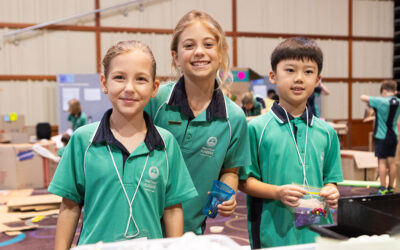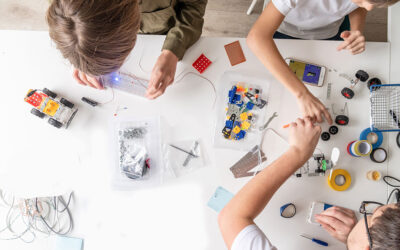Identifying and navigating through learning difficulties can be a long and daunting process. Figuring it all out when children are young and unable to communicate effectively can be doubly challenging.
It’s a situation Mamre allied health manager and south-east Queensland mum Marissa Carlyon knows all too well.
“We work a lot with little ones and their families who might be experiencing some kind of developmental delay or learning difficulties,” Ms Carlyon says.
“As a parent, it might be a bit tricky to understand your child’s signals because their words are still developing or their communication signals are really unique to them. Therefore, strengthening that connection and communication between parent and child brings much better developmental outcomes.”
Brisbane-based not-for-profit Mamre has put together a resource called Connect Play Learn. Emphasising the importance of using a relationship-focused approach to get the best out of the therapy experience, Ms Carlyon says the online program helps parents and carers connect and play with their child at home in new ways.
“The idea was sparked at the beginning of coronavirus,” she says.
“We had many people unable to come into a session asking what they could do with their child at home. There were also remote families who wanted resources without requiring a huge amount of guidance from a therapist.”
She says a team of occupational therapists worked with children and families to compile a self-paced learning package with everything built in.
“The package for parents and carers of children aged up to seven years is about three hours, with information and videos,” Ms Carlyon says.
Connect Play Learn supports a broad range of situations.
“It’s appropriate for those with learning difficulties or developmental delays, and also those with some more significant disability. Also those that are typically developing kids, but might need some help in connectedness and reciprocal play.”
Ms Carlyon says families where their Little One hasn’t yet received a diagnosis and parents wanting to try something at home can also purchase the program.
“It is positioning that parent-child relationship as the most important relationship in that child’s life. I think for longer term that sets families and parents up really well,” she says.
Expert tips for connecting with kids with learning difficulties
Connecting with your child can strengthen all aspects of a child’s development. Marissa Carlyon offers these tips for communicating with kids with learning difficulties or developmental delays.
Pause and wait. Though it’s our natural instinct as parents to do more and help more for our kids, pause and wait for their signal. Then you can respond in a way that will strengthen their speech, motor skills and thinking/feeling skills. They are wired to become more independent and actively explore their world. Our response should support this, not do it for them.
Bring back the joy. Fun, joy, connection are incredibly important in childhood development. When things are a struggle, it doesn’t feel good. Try putting the joy back into everyday things. A child’s brain is most lit up when they are connecting with you. Often this is most powerful when they give us a signal (e.g., a sound or movement) and we respond (e.g., smile, show excitement, say something).
Good enough parenting. Nobody is able to “get it right” 100 per cent of the time. We can’t be available and responsive all of the time. We are human and sometimes make mistakes. ‘Good enough parenting’ means we meet our children’s needs most of the time. It means attempting to be responsive and empathetic to your child, but recognising that you won’t always get it right.
In those moments when we don’t get it right (e.g., we raise our voice or snap at our children), good enough parents take the time to repair and reconnect with their children afterwards. This opportunity for repair and reconnection is an important learning opportunity for your child.
“Whether you’re looking to support your child’s development, emotional regulation or to strengthen your connection with your child, these simple principles can help and make interactions with your child feel easier, happier, and rewarding!”
Win free access to the Connect Play Learn program
Kids in the City / Kids on the Coast has six months free access to the Connect Play Learn program. You could be one of five (5) lucky readers to have free access to the program simply by entering your details online. The competition closes on August 12, 2022. For full terms and conditions, visit the website.
Keep Reading
Anxiety in kids — know the signs
What is Sensory Processing Disorder?
So your child is on the spectrum: What now?


